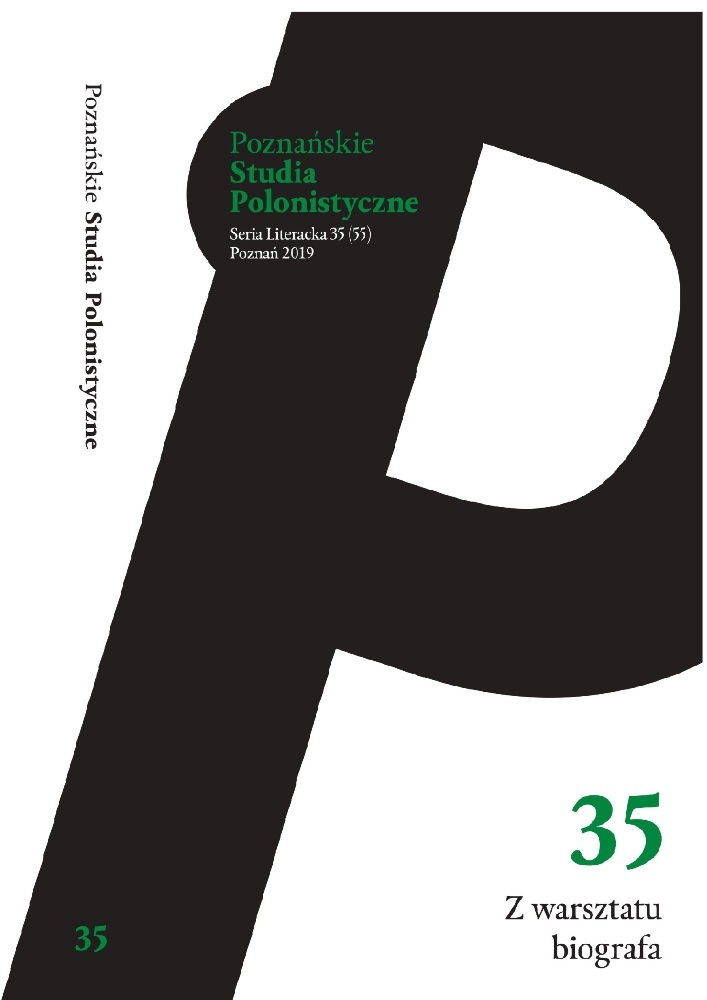Abstract
The article presents Dimitar Dobrev’s perspectives on the literary work of Wilhelm Mach and his understanding of his friendship with the Polish author. The arguments are mainly based on forgotten materials documenting the relationship between Dobrev and Mach. The most interesting aspects of the friendship between the writers are those causing conflicts and misunderstandings. The authors disagree over the definition of realism and the role of literature in the contemporary world, and those differences are intensified by Dobrev’s and Mach’s opposite comprehension of the ideals of a socialist society. The paper’s main topic is how the discrepancies between Mach and Dobrev influence their style and – particularly in Mach’s case – how they affect his experimental prose. The disagreements between the writers are both frustrating and inspiring for them as authors and they also distort the perception of Mach’s work as presented for his Bulgarian readers in Dobrev’s essays.
References
Bartelski Lesław (1969), Nasz przyjaciel – Mach, „Kultura”, nr 4 (294), s. 8.
Dobrew Dymitr (1971), „Mach nauczył mnie kochać Polskę…”, „Kamena”, nr 10, s. 1-8.
Głowiński Michał (1969), Powieść młodopolska. Studium z poetyki historycznej, Ossolineum, Wydawnictwo PAN, Wrocław.
Głowiński Michał (2010), Kręgi obcości. Opowieść autobiograficzna, wyd. 2, Wydawnictwo Literackie, Kraków.
Jaworski Kazimierz (1970), Bułgarska krewniaczka „Kameny”, „Kamena”, nr 5, s. 9.
Juda Celina (2004), Pod znakiem BRL-u. Kultura bułgarska w pułapce ideologii, Universitas, Kraków.
Mach Wilhelm (1959), Z cudzoziemcem po Warszawie, „Polska”, nr 7, s. 13-16.
Mach Wilhelm (1971a), Szkice literackie. W „szkole krytyków”, t. 1, Czytelnik, Warszawa.
Mach Wilhelm (1971b), Szkice literackie. W Polsce i w świecie, t. 2, Czytelnik, Warszawa.
Magris Claudio (2018), Dunaj, przeł. Anna Osmólska-Mętrak, Joanna Ugniewska, Wydawnictwo Literackie, Warszawa.
Mielczarek Tomasz (1999), Czerwony sztandar na jońskiej kolumnie: z dziejów „Nowej Kultury” (1950-1963), „Rocznik Historii Prasy Polskiej”, z. 1 (3), s. 71-98.
Ritz German (2002), Nić w labiryncie pożądania. Gender i płeć w literaturze polskiej od romantyzmu do postmodernizmu, przeł. Bronisław Drąg, Andrzej Kopacki, Małgorzata Łukasiewicz, Wiedza Powszechna, Warszawa.
Synoradzka-Demadre Anna (2016), Jerzy Andrzejewski. Przyczynek do biografii prywatnej, Wydawnictwo Krytyki Politycznej, Warszawa.
Śmieja Wojciech (2015), Homoseksualność i polska nowoczesność. Szkice o teorii, historii i literaturze, Wydawnictwo UŚ, Katowice.
Tomasik Krzysztof (2014), Homobiografie. Wydanie drugie, poprawione i poszerzone, Wydawnictwo Krytyki Politycznej, Warszawa.
Динеков Петър (2013), Дневници 1933-1992, „Библиотека”, nr 6, s. 55-95.
Добрев Димитър (1966), Писателят Вилхелм Мах – голям приятел на българския народ, w: tegoż, За красота в живота. Лирическа проза, литературни статии, спомени, Издателство „Народна култура“, София, s. 265-283.
Добрев Димитър (1983), По пътеките на моя живот. Интервюта и спомени от различни години, Издателство Български писател, София.
Димитър Добрев (2019), [online], [dostęp: 29 kwietnia 2019], https://literaturensviat.com/?p=72081.
Пигулева Нели (2009), Храмът «Светлоструй», Издателска и рекламна къща Парнас, Русе.
Taчев Веселин (1991), Светлоструй. Документален сборник 1928-1941, Държавен Архив, Русе.
License
Authors
Authors of texts accepted for publication in „Poznańskie Studia Polonistyczne. Seria Literacka” are required to complete, sign and return to the editor's office the Agreement for granting a royalty-free license to works with a commitment to grant a CC sub-license.
Under the agreement, the authors of texts published in „Poznańskie Studia Polonistyczne. Seria Literacka” grant the Adam Mickiewicz University in Poznań a non-exclusive, royalty-free license and authorize the use of Attribution-NoDerivatives 4.0 International (CC BY-ND 4.0)Creative Commons sub-license.
The authors retain the right to continue the free disposal of the work.
Users
Interested Internet users are entitled to use works published in „Poznańskie Studia Polonistyczne. Seria Literacka” since 2016, for non-commercial purposes only, under the following conditions:
- attribution - obligation to provide, together with the distributed work, information about the authorship, title, source (link to the original work, DOI) and the license itself.
- no derivatives - the work must be preserved in its original form, without the author's consent it is not possible to distribute the modified work, such as translations, publications, etc.
Copyrights are reserved for all texts published before 2016.
Miscellaneous
Adam Mickiewicz University in Poznań retains the right to magazines as a whole (layout, graphic form, title, cover design, logo etc.).
